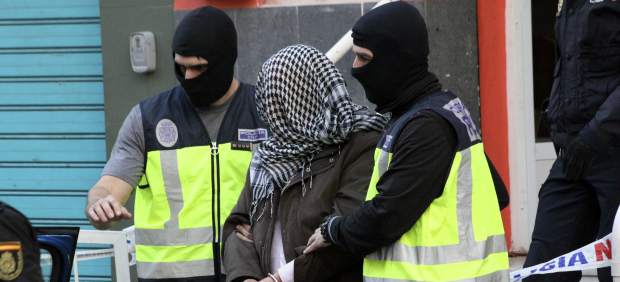 Several media outlets in Europe continue to sow confusion and amalgams following the terrorist attacks that hit Barcelona and Cambril. The Moroccan origins of the radicalized youth involved in these attacks offered far-right journalists and anti-migrant groups a scapegoat and a lazy way to explain the attacks.
Several media outlets in Europe continue to sow confusion and amalgams following the terrorist attacks that hit Barcelona and Cambril. The Moroccan origins of the radicalized youth involved in these attacks offered far-right journalists and anti-migrant groups a scapegoat and a lazy way to explain the attacks.
By doing so, they failed to consider the deep roots of radicalization in their home countries. The fact that radicalization took place in Spain and not in Morocco and that the attacks were plotted in Europe highlights the need for a thorough analysis of Spain’s domestic radicalization problem.
The youth perpetrating the Barcelona and Cambril attacks are more Spanish then they are Moroccan. Some of them have been born and others were raised in Spain attending Catalan schools and living among Spaniards. Spanish authorities say that they have been radicalized in a local mosque in Ripol. The Imam of the mosque, Abdelbaki Es Satty, have been subject to numerous investigations. Yet, he managed to stay in Spain leading young Muslims astray.
The Catalan interior ministry has confirmed that it was warned by Belgian authorities in March 2016 about the imam who later formed, radicalized and organized the terror cell that killed 15 people in north-east Spain last week. These disillusioned youth could have posed a danger to any country in the world that does not share the same ideological vision of ISIS, which claimed responsibility for the attacks. Their allegiance goes to IS Jihadist ideology, a global calamity that requires international coordination.
The recent attacks that shook Spain bring back memories of 11 March 2004, when 191 people were killed and more than 1,800 others injured in a series of train bombings in Madrid, carried out by al-Qaida, which came to represent an unprecedented form of Global Jihadism threatening the whole world.
Thirteen years may have passed since the Madrid bombings, but Spain was yet again a prey of another abhorrent terror attack. Barely a week goes by without police announcing the arrests of people who have become radicalized online. More than 720 people have been detained in Spain in connection with “jihadi terrorism” since the carnage in Madrid, and almost a quarter of the 178 people arrested for terrorism-related activities over the past three years are from Barcelona.
A recent study from West Point’s Combating Terrorism Center found that most of those arrested on charges of terrorism have been radicalized in Spain through the internet or via contact with radicalizing agents in their “ghettos”. Nine out of every 10 detainees included in the survey have been radicalized partly or fully while inside Spain.
The Barcelona and Cambril attacks also indicate an intelligence failure. These attacks are no “lone wolf” plots as they have been coordinated in a larger cell. Spanish authorities’ failure to intercept the terrorists is largely ascribed to the decentralized character of the Spanish law enforcement forces, especially in Catalonia, which is bracing for a fully-fledged independence from Spain.
Spain, Britain and Germany to a large extent have decentralized intelligence and police communities, as opposed to France, which has a more centralized system. This decentralization slows rapid action against terrorist cells.
The lack of oversight over the religious discourse at mosques and the tolerance of radicalizing agents are also to blame for the recent terrorist attacks.
On the other hand, there is no exaggeration in saying that without Morocco’s cooperation, Spain and Europe will be a blood bath. The effectiveness of Moroccan intelligence agencies and their pro-activeness helped Spain dismantle several terrorist cells in its territories and thwart attacks that could have claimed thousands of lives. By acting on the Jihadists in Europe, Morocco is also protecting its own security as most of these terrorists are seeking easy preys whenever they are whether in Morocco or Spain. In their Jihadist view, they are both heretic states.
It was Moroccan intelligence that helped locate Abdelhamid Abaaoud, the mastermind of the November 2015 attacks in Paris. Morocco’s intelligence service also alerted German counterparts in September 2016 that Anas Amiri was about to perpetrate a terrorist attack on German soil three months before he did.
Yet, despite being an IS target itself, Morocco remained insulated from terrorist attacks since the creation of the terrorist group in 2014. Thanks to a comprehensive strategy combining social, economic and security aspects besides a reform of the religious sphere, Morocco managed to counter radicalization. The Kindgom has also updated its legal apparatus against foreign fighters who face imprisonment upon their return home.
The creation of the Moroccan Central Bureau of Judicial Investigation (BCIJ), Morocco’s counter-terrorism agency, in 2015, played a key role in boosting international cooperation with international partners leading to numerous disruptions of alleged terrorist cells and prosecutions of associated individuals.
Morocco and its security services are indispensable for Spain’s and the EU’s fight against terrorism. The decades of laxity by European authorities let the Muslim, including Maghreban expatriates, a prey to radicalized Imams and associations.
These radicalized migrants now pose a threat to Morocco, Algeria, Tunisia and Libya as much as they threaten Europe. Hence the need for sustained cooperation in terms of intelligence sharing, de-radicalization and joint operations as well as efforts to further integrate the Muslim community.
The spread of confusion by highlighting every now and then the origins of the terrorists will backfire. Spreading such amalgams plays into the discourse of far-right groups who are seeking to pin all that goes wrong in the Western societies on Muslim immigrants. The backlash against Moroccans has effectively started following the Barcelona attacks. Such discrimination, if not contained, will result in a counter-reaction and an increased stigmatization, which could lead to radicalization. The wise thing to do is to tackle terrorism as a global problem requiring the help and contribution of the Muslim diaspora, authorities and the media.
